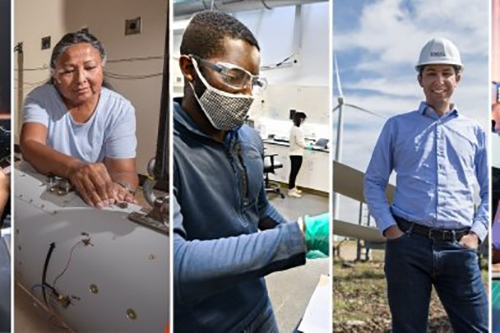The U.S. Departments of Energy (DOE) and Treasury and the Internal Revenue Service (IRS) announced several programs to accelerate domestic clean energy manufacturing and ensure that traditionally underserved communities benefit from clean energy technologies.
DOE is partnering with Treasury and the IRS to implement two programs funded by the President’s Inflation Reduction Act:
- The Low-Income Communities Credit Rebate Program,
- The Advanced Energy Projects Credit.
Continuing the effort to improve disadvantaged communities, DOE also opened applications for the Advanced Energy Manufacturing and Recycling Grant Program. Endowed with $750 million and funded by the Bipartisan Infrastructure Act to support industrial projects by small and medium-sized manufacturers in energy communities. These announcements underscore the Administration’s commitment to lead an equitable transition to clean energy and support the goals of President Biden’s Justice 40 Initiative.
“Disadvantaged communities have the people, the capabilities, and the willpower. But they often lack the opportunities and resources to invest in clean energy infrastructure that will revitalize their local economies. These transformative programs and grants will strengthen the nation by ensuring that American workers and businesses lead us worldwide. And deliver on the President’s promise not to leave communities behind during this critical energy transition,” said U.S. Secretary of Energy Jennifer M. Granholm.
Advanced Energy Manufacturing and Recycling Grant Program.
DOE’s Advanced Energy Manufacturing and Recycling Grant Program opened for applications for the first funding opportunity. Which invests $350 million for small and medium-sized manufacturers (SMMs) to produce or recycle advanced energy goods in energy communities. A mapping tool is available to show eligible underserved communities under the program.
The program will give priority to applications from minority-owned businesses. All applicants must submit a Community Benefits Plan that demonstrates the impact and benefits of the project to the host community and region.
DOE’s Office of Manufacturing and Energy Supply Chains manages the program. It will also establish a competitive technical assistance program in collaboration with the National Renewable Energy Laboratory (NREL). This is to support small and medium-sized manufacturers in feasibility analyses. And other planning activities in support of transitioning dislocated workers into clean energy jobs and idled energy infrastructure into hubs for future economic growth.
It can be of your interest: Sustainable use of domestic biomass and waste resources to produce low-carbon biofuels and bioproducts


